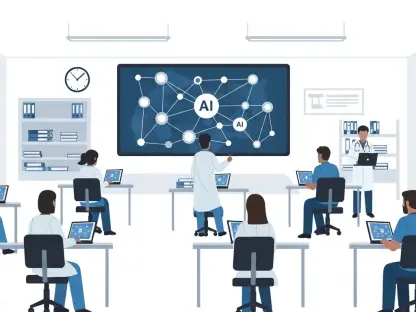The recent cyberattack on Change Healthcare has sent ripples through the U.S. healthcare system, disrupting operations and creating chaos for providers nationwide. This unprecedented event has prompted an immediate and comprehensive response from the U.S. Department of Health and Human Services (HHS). The goal is clear: to mitigate the impacts of the attack and safeguard the integrity of healthcare services. Here’s a detailed look at how HHS can effectively address this crisis.
Understanding the Impact
The Scope of the Cyberattack
The cyberattack on Change Healthcare has been a significant blow to healthcare services across the country. With systems down and communications disrupted, hospitals, doctors, and pharmacies are grappling with operational challenges. The priority for HHS is to ensure that care delivery continues uninterrupted despite these hurdles. This requires a multifaceted approach, starting with a clear understanding of the attack’s scope. It is essential to identify the specific vulnerabilities exploited and the extent of the data breaches that occurred, influencing the immediate and long-term strategies for mitigation.
Understanding the depth of the impact involves looking at both the technical and operational aspects of healthcare services. Operational challenges range from the inability to process claims and manage patient data to potential delays in treatment and diagnosis. Additionally, ensuring that the sensitive personal data of millions of patients is secure remains a critical concern. By comprehensively assessing these elements, HHS can develop targeted strategies that address both immediate disruptions and long-term security enhancements, thereby restoring stability to the healthcare ecosystem promptly and effectively.
Immediate Disruptions Faced by Healthcare Providers
In the aftermath of the attack, healthcare providers have faced numerous challenges. From the inability to process claims to cash flow issues, the impact has been far-reaching. Payments have been delayed, adding financial strain to an already burdened system. HHS has recognized these concerns and is working swiftly to address them. The immediate focus is to restore normalcy as quickly as possible while implementing mechanisms to support providers during this tumultuous period. As healthcare providers struggle with these challenges, the continuity of patient care has become an urgent priority, necessitating swift and effective responses.
The immediate disruptions go beyond financial strain, affecting everything from resource allocation to patient care protocols. Hospitals are finding it difficult to manage inventory and staffing efficiently, while outpatient services face delays in scheduling and patient communication. This multifaceted disruption underscores the need for a coordinated response that not only addresses the administrative and financial issues but also supports the clinical side of healthcare delivery. HHS’s role in this context extends to providing guidance on best practices for managing these immediate challenges and ensuring that the support mechanisms in place are effective and accessible to all affected parties.
Coordinating a National Response
Communication and Collaboration
HHS’s response has been marked by seamless communication and collaboration with various stakeholders. Engaging with UnitedHealth Group (UHG) leadership, state entities, and other federal agencies, HHS is ensuring that all parties are on the same page. This coordination is crucial for an effective response. By maintaining open lines of communication, HHS ensures that accurate information and actionable intelligence are shared promptly. This collaborative effort is designed to minimize confusion and ensure that all stakeholders have access to the resources and information they need to manage the crisis effectively.
Effective communication and collaboration involve not only sharing information but also ensuring that there is a unified strategy for addressing the attack’s aftermath. Regular updates and coordination calls between HHS, UHG, and state health departments help synchronize efforts at various levels, making it easier to identify and address gaps in response measures. Additionally, leveraging digital communication channels helps streamline information dissemination, allowing for quicker and more efficient responses. This holistic collaboration approach ensures that no stakeholder is left in the dark and that the overall response effort remains cohesive and focused on the critical goal of restoring healthcare operations.
Federal Interagency Collaboration
The involvement of multiple federal agencies underscores the gravity of the situation. HHS is coordinating efforts with the FBI, the Cybersecurity and Infrastructure Security Agency (CISA), and the White House to mount a comprehensive defense. This collaboration aims to bolster threat intelligence and provide the necessary support to fend off further disruptions. The unified federal response is a testament to the critical nature of protecting the healthcare infrastructure. By leveraging the expertise and resources of various agencies, HHS can enhance its capacity to address both immediate and long-term cybersecurity challenges posed by the cyberattack.
Federal interagency collaboration extends to sharing technological resources, expertise in threat analysis, and coordinated response protocols. The FBI’s role in investigating the cyberattack complements CISA’s capability to provide immediate technical assistance and remediation strategies. This collective approach ensures that the response is not only swift but also well-rounded, covering all facets of the incident from legal implications to technical fixes. Continuous updates and interagency meetings ensure that the strategies remain aligned with the evolving nature of the threat, thereby providing a dynamic response that can adapt to new challenges as they arise.
Immediate Actions by CMS
Expediting Claims Processing
To mitigate the financial impact on providers, the Centers for Medicare & Medicaid Services (CMS) has implemented several crucial measures. One of the key initiatives is allowing affected Medicare providers to switch their claims processing clearinghouses quickly. Accelerated electronic data interchange (EDI) processes have been put in place to ensure providers can continue submitting claims without undue delay. This initiative aims to streamline the administrative aspect of healthcare, minimizing the backlog and financial strain caused by the disrupted claims processing system.
The expedited claims processing model includes fast-tracking EDI enrollment processes and enabling temporary electronic submission workarounds. By prioritizing flexibility and accessibility, CMS ensures that healthcare providers retain the ability to manage their billing and claims processes effectively during the crisis. Additionally, clear guidance and support from CMS help providers navigate this transition smoothly. These measures, though temporary, are critical in maintaining the fiscal stability of healthcare providers and ensuring that patient care remains uninterrupted, thus mitigating the broader impact of the cyberattack on healthcare services.
Relaxed Regulatory Requirements
In response to the disruptions, CMS has advised Medicare Advantage (MA) organizations and Part D sponsors to relax prior authorization and utilization management requirements. This temporary relaxation aims to ease the administrative burden on providers, enabling them to focus on patient care rather than bureaucratic hurdles. Additionally, CMS encourages Medicaid and CHIP managed care plans to adopt similar strategies, providing a consistent approach across different programs. By reducing red tape, CMS aims to streamline operations and ensure that essential services can continue without unnecessary delays.
This relaxation of regulatory requirements represents a pragmatic approach to crisis management, recognizing that rigid adherence to standard protocols may not be feasible during extraordinary circumstances. By temporarily suspending certain administrative procedures, CMS helps healthcare providers allocate their resources more efficiently, ensuring that patient care remains a priority. This strategy also fosters a more adaptive and responsive healthcare environment, which is crucial for dealing with the immediate aftermath of the cyberattack. Ensuring that healthcare providers are not bogged down by administrative complexities allows them to respond more effectively to the crisis and focus on delivering high-quality care to their patients.
Financial Support and Accelerated Payments
Recognizing the critical cash flow issues, CMS has recommended accelerated payment mechanisms for providers. Drawing parallels with measures taken during the COVID-19 pandemic, CMS encourages affected providers to apply for these expedited payments to alleviate financial strain. This proactive approach ensures that healthcare services remain operational even in the face of significant disruptions. Financial stability is crucial for maintaining the continuity of care, and CMS’s initiatives aim to provide this stability despite the challenges posed by the cyberattack.
Accelerated payments involve advancing funds to providers based on previous billing cycles, ensuring that they have the necessary financial resources to continue operations. This approach helps mitigate the immediate cash flow issues that arise from disrupted claims processing systems. By providing financial relief quickly, CMS helps healthcare facilities maintain their staffing levels, manage their supply chains, and continue offering essential services to patients. This financial support mechanism is a vital component of the broader strategy to ensure that the healthcare system remains resilient even in the face of unforeseen disruptions.
Enhancing Cybersecurity Resilience
Lessons Learned and Future Preparedness
The cyberattack has laid bare the vulnerabilities within the healthcare system, underscoring the need for robust cybersecurity measures. HHS references its December 2023 concept paper, which outlines a comprehensive cybersecurity strategy. This strategy focuses on four main pillars: new voluntary healthcare-specific cybersecurity performance goals, support and incentives for hospitals to improve cybersecurity, increased accountability, and enhanced coordination. By drawing lessons from this incident, HHS aims to fortify the healthcare infrastructure against future cyber threats.
Future preparedness involves not only implementing the outlined cybersecurity performance goals but also periodically reviewing and updating these goals to address emerging threats. Continuous improvement cycles, coupled with regular cybersecurity drills, help ensure that healthcare providers are prepared for potential cyberattacks. This strategic framework also emphasizes the importance of fostering a cybersecurity culture within healthcare organizations. By embedding cybersecurity practices into their daily routines, healthcare providers can significantly reduce their vulnerability to cyber threats, thereby enhancing the overall resilience of the healthcare system.
Support and Incentives for Providers
To drive the adoption of better cybersecurity practices, HHS is advocating for support and incentives for healthcare providers. By offering financial assistance and technical support, HHS aims to make it easier for providers to enhance their cybersecurity infrastructure. This proactive stance is essential to prevent future attacks and build a more resilient healthcare system. The support mechanisms include grants, subsidies, and access to cybersecurity expertise, helping healthcare providers overcome the financial and technical barriers to cybersecurity improvements.
In addition to financial incentives, HHS also provides training and resources to help healthcare providers strengthen their cybersecurity measures. These resources include guidelines for implementing best practices, access to cybersecurity tools, and ongoing support for maintaining and updating cybersecurity systems. By lowering the entry barriers to high-quality cybersecurity, HHS aims to ensure that even smaller healthcare providers can enhance their defenses. This approach not only protects individual organizations but also contributes to the overall security of the healthcare ecosystem, making it more difficult for cybercriminals to disrupt healthcare services on a large scale.
Continuous Improvement and Accountability
HHS emphasizes the need for continuous improvement in cybersecurity practices. This involves not only adopting new technologies and protocols but also fostering a culture of accountability within the sector. By setting clear expectations and holding entities accountable, HHS aims to ensure that cybersecurity remains a top priority for all stakeholders. Continuous improvement requires regular assessments, updates to security protocols, and ongoing training for healthcare staff, ensuring that they are equipped to deal with ever-evolving cyber threats.
Accountability mechanisms include regular audits, compliance checks, and transparent reporting of cybersecurity incidents. These measures help identify gaps in existing security frameworks and provide opportunities for improvement. By fostering a culture of accountability, HHS encourages healthcare providers to proactively address their cybersecurity vulnerabilities. This approach ensures that cybersecurity is not an afterthought but an integral part of healthcare operations, contributing to the long-term resilience of the healthcare system. Through continuous improvement and accountability, HHS aims to build a robust defense against future cyber threats, ensuring the security and stability of healthcare services.
Financial Stability and Cash Flow Solutions
Addressing Provider Concerns
The financial ramifications of the cyberattack cannot be overlooked. Many hospitals, doctors, and pharmacies have expressed concerns over cash flow due to the inability to submit claims and receive payments. HHS, through CMS, acknowledges these issues and is taking steps to provide immediate financial support. This includes accelerating the processing of claims and offering advance payments to the most affected providers. Ensuring financial stability is crucial for maintaining the continuity of healthcare services and alleviating the economic burden on providers.
Addressing these concerns involves not only providing immediate financial relief but also implementing longer-term solutions to support providers during the recovery phase. CMS’s role in facilitating quick claim resolutions and advance payments helps stabilize the affected providers’ financial operations. By closely monitoring the financial health of these providers, HHS can offer targeted assistance where it is most needed. This tailored approach ensures that the support provided is effective and reinforces the resilience of the healthcare system against future disruptions.
Leveraging Past Experiences
The recent cyberattack on Change Healthcare has shaken the U.S. healthcare system, causing major disruptions and creating widespread chaos for providers across the country. This unprecedented incident has led to an immediate and thorough response from the U.S. Department of Health and Human Services (HHS). Their primary objective is to minimize the damage caused by the attack and ensure the continued reliability of healthcare services. Understanding that the stakes are high, HHS has mobilized all necessary resources and expertise to tackle the crisis head-on. This multifaceted approach involves not only addressing the immediate technical issues but also implementing stronger cybersecurity measures to prevent future breaches. Ensuring clear and open communication with healthcare providers and the public is a key component of HHS’s strategy, as it aims to rebuild trust and maintain the integrity of healthcare operations. The response also includes close collaboration with other federal agencies, private sector experts, and international partners to pool resources and share intelligence. This coordinated effort is essential to navigating the complexities of the cyberattack and restoring normalcy to the healthcare sector.









